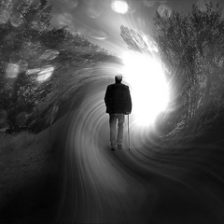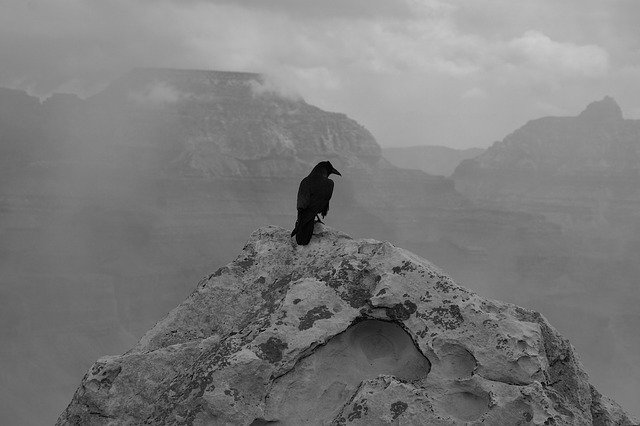
The night after I found out that I lost my job, a friend came over with McDonald’s ice cream sundaes in hand. I opened a bottle of wine and we ate ice cream, drank wine, and talked.
He was great, holding nothing but a positive outlook on my situation, while still validating what I was feeling.
I truly did have the same positivity, but it was battling against all of the raw emotions that were still churning about. Having him there helped tease it out and give it the air it needed to grow a bit stronger.
At one point, we started talking about the need to take steps. To not sit around and wait for something to look right or feel safe. And to not refrain from taking a step due to the uncertainty of how it could possibly lead to something beneficial.
It reminded me of the story in the Bible when the Israelites cross the Jordan River. He wasn’t familiar with it, so I found a copy of the Good Book, fumbled through it until I found the passage in question, and read it to him, specifically calling attention to the fact that it says the river was at flood stage. “Then it says, ‘…as soon as their feet touched the water’s edge, the water from upstream stopped flowing…'”
He got all excited. “What a great metaphor!”
We chewed on how powerful it was, taking a brief moment to acknowledge that it didn’t matter to either of us if the story “really happened” because its power is found in the truth of the illustration: The water didn’t stop flowing until the people stepped into it.

We talked about the tendency for us to stand at the edge of our metaphorical rivers and wait for the raging waters to stop flowing before we step away from the safety of the shoreline.
In other words, we stand alongside a situation and wait for it to look safe or for an obstacle to be removed before we move forward. But only in moving forward – only in stepping into what looks impossible or like it may even harm us – can the obstacle be overcome.
It was a great conversation and held potent relevancy as we discussed our lives and our futures.
Shortly after, I was reflecting on the conversation and it reminded me of a story I wrote as a late teenager.
It’s no secret that The Wizard of Oz has always been one of my favorite films. Many people don’t pay attention to the fact that when Dorothy begins her journey down the yellow brick road, there’s also a red brick road adjacent to it. In the story I wrote, Dorothy didn’t have a contingent of little people singing a song about which road to follow, so she got confused and took the red brick road by mistake (in her mind, this made perfect sense because it was the same color as the coveted ruby slippers that she’d been given).
I haven’t read the story in forever so I’m fuzzy on the details, but at one point Dorothy ends up at the witch’s castle with her life on the line and she gets chased to the turret atop one of the castle towers. Desperately trying to avoid being caught, she climbs out a window and, while precariously perched high on its ledge, stares at another tower across the way.
Unable to turn back, she gazes down at the ruby slippers on her feet, musters up as much courage as she can, and cautiously steps out into the air. The slippers begin to glow vibrantly as something forms under her feet to keep her from falling.

She hesitantly takes the next step onto thin air, fully supported as a walkway forms beneath her. The walkway continues to extend itself – but only as far as each step that she takes; it never extends out in front of her.
Fear sets in as she hears her pursuers. She looks back to see them starting to climb out the window after her, causing a paralysis that steals her focus and courage. The walkway begins to erode under her feet and she feels herself losing control, but once she regains focus and moves forward, it solidifies and she gets to the other tower and through the window. She turns back in time to see the walkway dissolve, and I’m guessing that her chasers probably fell to their demise.
When I penned the story, I had no real concept of the notion of deliberately stepping into nothingness with only the trust that somehow things will be okay. I certainly wasn’t familiar with any biblical stories to that effect (though there may have been some other influence that middle-age has caused me to forget). But interestingly, even though I don’t recall many details of the story, that scene has always stuck in my mind with arresting clarity.
A couple nights ago, my kids and I were watching Onward, Pixar’s latest flick, and there was a very similar scene. There were no ruby slippers, of course, but there was a magical staff.
I’ll be honest. I had a brief response of internal indignation that my scene – my 30-year-old scene living on faded pages tucked away in an old Pee-Chee in my office – had been repurposed by Pixar.
Okay, so it was more like indignation mixed with excitement (“See, I actually do have good ideas!”) and a dash of regret (“Aww, I shouldn’t let my stuff just fall by the wayside…”), along with a quick battle of scarcity vs. abundance (“If I don’t hurry and get my other ideas out there, they’ll be used up by someone else and then what?” “Wait, no, the pie is big enough for everyone. There’s plenty to go around. Plus, this scene is different enough from mine.”).
It’s amazing – and slightly exhausting – how much can go through your mind in a split second.
Anyway, I quickly refocused so I could absorb the scene.
As I watched the Pixar character take his steps, I thought about what the scene was representing. I also thought about Dorothy in the story that I wrote decades ago. And about the Israelites crossing the Jordan River thousands of years ago.
And I thought about how stories can serve as fantastic, nonthreatening illustrations of powerful truths that can have enormous significance in our lives.
Of course, it’s one thing to watch these things on a screen or read them on a page. It’s something else when we’re faced with these situations in real life.
So I also thought – perhaps most importantly – about myself and how I hope that each time life brings me to the edge of another raging river, I’ll have the confidence I need to step into the water.




